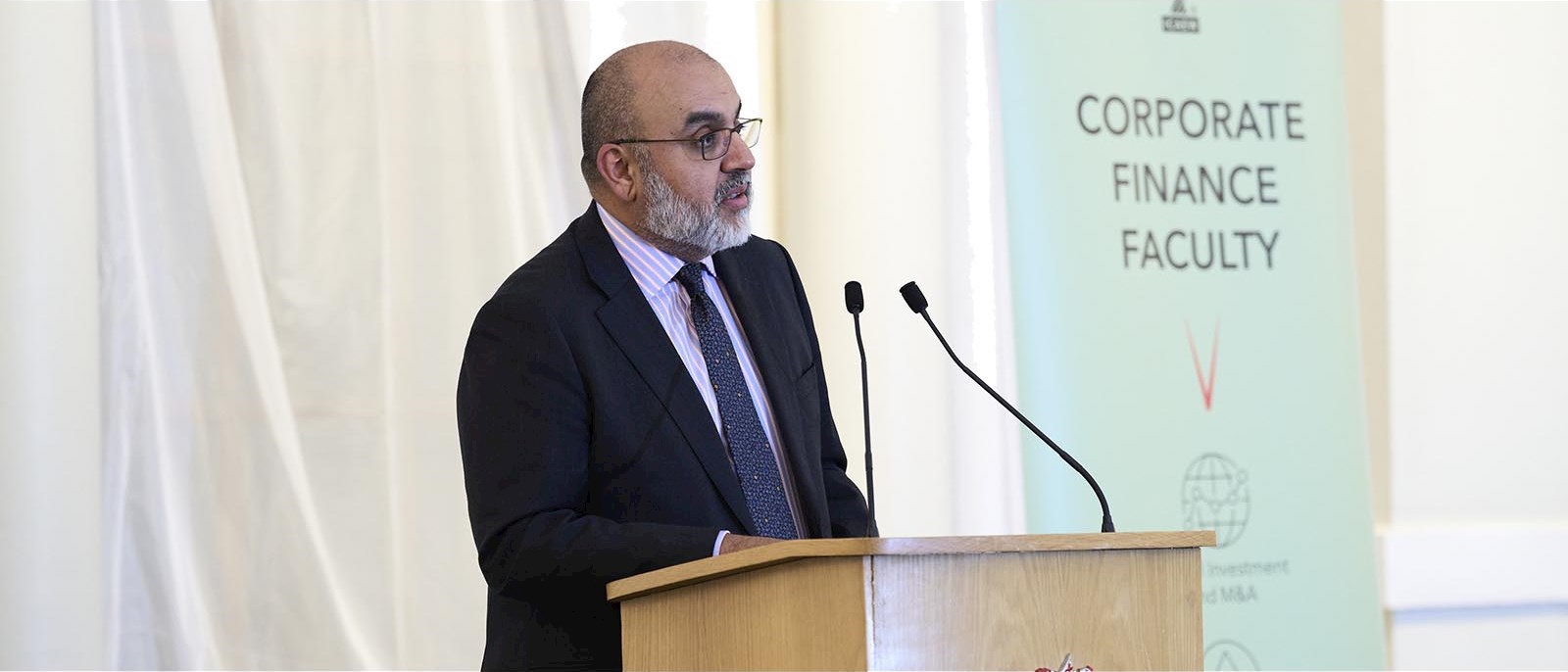
Faculty feeds back on investment security unit effectiveness
The Corporate Finance Faculty responded on behalf of its members and ICAEW to the former Department for Business, Energy and Industrial Strategy (BEIS) parliamentary committee’s call for evidence on the first year of the National Security and Investment Act (NSIA), which came into effect in January 2022. BEIS wanted feedback on the effectiveness of the Investment Security Unit (ISU). ICAEW head of corporate finance, David Petrie, is on an expert panel that advises the ISU.
The faculty response said:
- Interactions with the ISU could be improved, or recalibrated, in the context of informal and exploratory discussions in advance of a notification and for better continuity of ISU officers on individual cases.
- Our members report difficulties when attempting to engage the ISU in informal consultations or pre-notification discussion – despite parties being encouraged to do so by government guidance. The advertised openness of the ISU for consultation was reassuring for the business and advisory communities, based on the effectiveness of the consultative approach of other UK regulators. But many members’ experience is that this willingness has not been evident in practice, or that pre-notification discussions are particularly valuable. The government should consider giving more granular guidance for pre-consulting the ISU to better manage parties’ expectations.
- Our members believe interactions with the ISU would be more efficient if there was a dedicated officer for individual notifications. This is based, again, on experience of interacting with other UK regulators. The ISU operates a hub and spoke model to ensure its decisions are informed and evidenced. The communication to notifiers of outcomes or decisions of such a model would undoubtedly be more effective if from a single ISU contact point. The government should reconsider having a dedicated case officer per notification for continuity in ongoing communications.
- The ISU could plan how to ensure the current response to notifications will be maintained when, as generally expected, there is a sharp increase in notifications of restructurings and cases involving businesses in distress.
- According to our members, the ISU has so far responded to notifications by the statutory deadline. However, restructurings – particularly at the smaller business end – usually involve the timing and planning of such cases being even more accelerated and/or information less forthcoming. The ISU should prepare for how it might need to adapt, so its response to such notifications will not be unnecessarily Any considerations for notifiers should be published in a Market Guidance Note.

Earn-outs and cyber security best practice
The Corporate Finance Faculty has two best practice guidelines planned for publication later this year.
First to be published in autumn 2023 will be an updated guideline on earn-outs, which will be co-written by the faculty and Grant Thornton partner Patrick O’Brien and director Mark Cunanan. O’Brien is head of sale and purchase advisory (SPA) and Cunanan is SPA post-completion services leader.
The guideline will reflect the role that earn-out arrangements can play in helping to keep deals on track and will cover the perspective of both acquirer and seller, as well as current trends. It will be peer reviewed by the ICAEW technical committee.
The second guideline this year will be an update on the earlier guideline the faculty published in 2014 – Cyber-Security in Corporate Finance. That guideline had the support of the Cabinet Office, and was a market-led initiative that included contributions from the principal parties in deals and investment. It prompted changes in practice and due diligence without the need for regulation. Now almost 10 years on, cyber-security threats have evolved in terms of nature and source.
The faculty has already secured support for the initiative from the National Cyber Security Centre. The faculty will reconvene the Taskforce of market participants and a working group to develop the guidance.

R&D tax reliefs consultation
The Corporate Finance Faculty contributed to the ICAEW response to the R&D Tax Reliefs Review: Consultation on a single scheme published by the government in January. The response was led by the tax faculty.
The consultation sought views on the design of a single, simplified research and development (R&D) tax relief scheme, merging the existing research and development expenditure credit (RDEC) and the small and medium enterprise (SME) R&D relief.
The specific responses, which members fed into, said:
- While many members empathised with the government’s focus on mitigating fraud within R&D tax relief, there was a concern that tax policy was being designed with this at the forefront as opposed to the best way to achieve the policy objective. This is resulting in a direction of travel where compliant taxpayers are being penalised because of the poor behaviours of the minority within the R&D regime.
- Furthermore, these changes will disproportionately affect SMEs that are often already significantly more disadvantaged than their larger competitors by the increased cost of living and energy crisis. There was a feeling that UK tax policy was less focused on how to ensure the UK can be a competitive jurisdiction in which to invest by supporting smaller businesses and start-ups. There was a unanimous view that targeted compliance activity would be far more effective at mitigating fraud as well as more equitable overall than the blanket shifts in policy proposed.
- It is also important that the impact of merging the two R&D schemes is considered in light of all the other recent R&D changes. Members are already reporting that R&D businesses are scaling back investment and, in some cases, moving headquarters overseas in response. Start-ups are particularly affected by the changes and there is concern that founders might view the UK as a less appealing place to establish a business.
- Most members agreed that merging the schemes could offer some simplification as SMEs would no longer need to decide which scheme they were eligible to claim under, given that some costs only qualify under the large scheme. However, members didn’t consider that the merger would, in general, enable better quantification and certainty over the quantum of the relief. This might apply in limited circumstances where the SME had carried forward R&D credits; however, this is not anticipated to apply widely.
The full response can be found here.
In the 2023 Spring Budget, the UK Chancellor, Jeremy Hunt announced that for expenditure from 1 April 2023 the RDEC rate would increase from 13% to 20%, the SME additional deduction rate would reduce from 130% to 86%, and the SME payable credit rate from 14.5% to 10%.
And in regard to the consultation, the technical note from the Treasury said: “The government’s consultation on the possible merging of the RDEC and SME schemes closed on 13 March. In order to keep open the option of a merged scheme, the government will publish a summary of responses and draft legislation on Legislation Day in July 2023. The consultation included questions on the case for providing more generous support to R&D intensive companies.
“Following the announcement of this new scheme and its commencement from 1 April 2023, the government will consider the responses to these questions, and will keep the scheme design under review to ensure its effectiveness and its delivery of value for money. The government will continue to engage with industry on how this support might be improved going forward.”

Corporate finance faculty AGM – 16 May
Members of the Corporate Finance Faculty are invited to attend the faculty’s annual general meeting to be held at Chartered Accountants’ Hall in London on 16 May 2023.
The meeting will include a short review of the faculty’s work on behalf of its members and ICAEW over the past year. Mo Merali (below), chair of the faculty, and David Petrie, ICAEW’s head of corporate finance, will also outline the faculty’s plans for the rest of 2023 and for 2024.
At its meeting following the AGM, the board will approve the new chair of the faculty to replace Merali, who has served in the role for five years. The new chair will be announced at the meeting.
Always very well attended by senior representatives of the faculty’s 85 member organisations, the AGM is a good opportunity to meet the faculty’s board, technical committee and staff.
The meeting will take place from 12pm until 1.15pm and a buffet lunch will be provided. The agenda will include the challenges faced by the corporate finance market in 2022, and the outlook for M&A this coming year in the context of tougher lending conditions, but still high levels of dry powder and cash on corporate balance sheets.
Also under discussion will be the impact of the UK’s National Security and Investment Act introduced in January 2022, changes to the Listings Rules and further guidance on environmental, social and governance.
If you have any questions about the event – or on the faculty’s work – please get in touch with Debbie O’Neill at debbie.o’neill@icaew.com or on +44 (0)20 7920 3526, or Helen Jones at helen.jones@icaew.com or on +44 (0)20 7920 8599.
Faculty news
The latest from ICAEW’s centre of professional expertise in corporate finance. Here you can access news from throughout the year.



